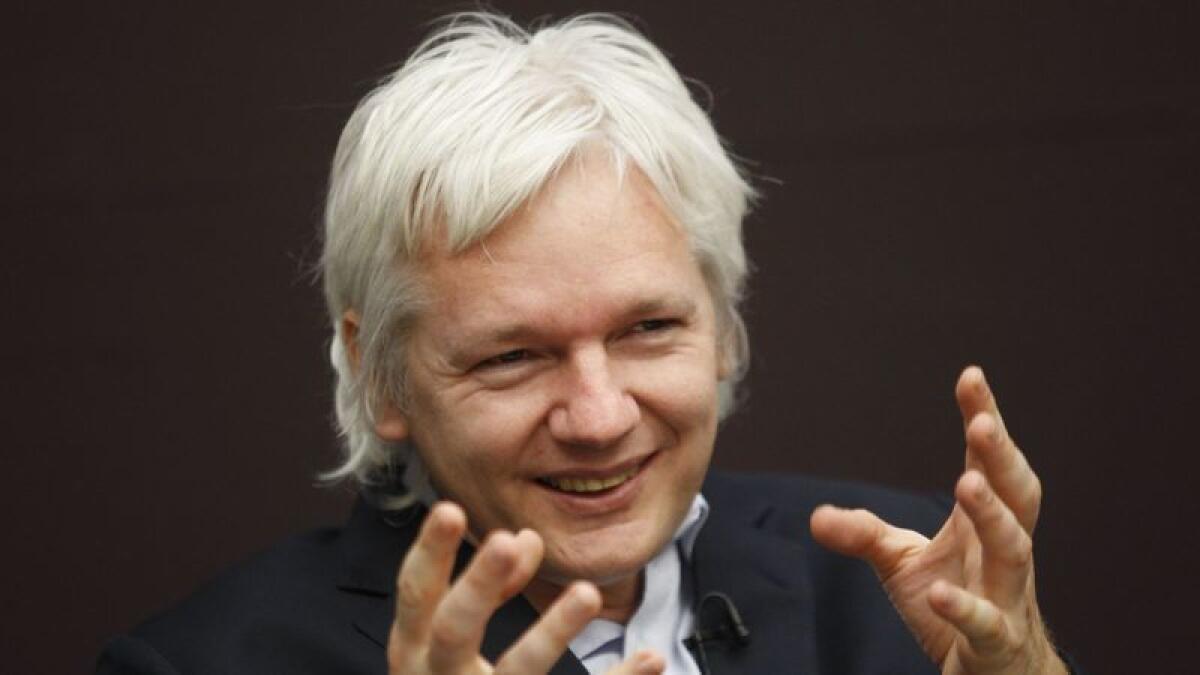Opinion: The new Julian Assange indictment is a shot across the bow of a free press

- Share via
The Los Angeles Times editorial board expressed a measure of relief last April after an indictment against WikiLeaks founder Julian Assange was unsealed. Our editorial noted that Assange had been accused not of publishing classified information downloaded by Chelsea Manning, but rather of conspiring with the then-Army intelligence analyst to crack a government password in search of secret material to divulge.
But we also expressed concern that although Assange was formally accused of violating a law against computer intrusion, the indictment alleged more generally that “Assange encouraged Manning to provide information and records from departments and agencies of the United States.”
That seemed to suggest that the government might go after Assange — and potentially conventional journalists as well — for interactions with whistle-blowers that eventually resulted in the publication of classified information.
Our concern turned out to be well placed, at least in regard to Assange. On Thursday, the Justice Department released a superseding indictment that charges Assange with obtaining and disclosing national defense information in violation of the Espionage Act.
But does the indictment also pose a threat to traditional journalists? This is really two questions, and it’s useful to distinguish them.
Enter the Fray: First takes on the news of the minute »
The first is whether the legal theory reflected in the indictments could be used against journalists who express a willingness to accept classified information. The ominous answer seems to be yes.
The indictment says Assange “repeatedly encouraged sources with access to classified information to steal and provide it to WikiLeaks to disclose.” Although Assange’s solicitation was made on a website, mainstream reporters in their contacts with sources also at some point make it clear that they would be willing to receive classified information.
The second question is whether the government will actually seek similar indictments of investigative reporters, their editors and their publishers.
Not necessarily. In announcing the indictment, Asst. Atty. Gen. John C. Demers, the Justice Department’s top national security official, said that it isn’t the department’s policy to target journalists for their reporting.
Demers added: “Julian Assange is no journalist. This is made plain by the totality of his conduct as alleged in the indictment — i.e., his conspiring with and assisting a security clearance holder to acquire classified information, and his publishing the names of human sources” (a reference to confidential informants relied on by U.S. diplomats and intelligence officials in foreign countries).
Demers could have added that because of WikiLeaks’ role in publishing Democratic emails hacked by Russia, Assange is an extraordinarily unpopular, even toxic, figure for a lot of Americans (though maybe not for President Trump, who during the 2016 campaign said: “I love WikiLeaks”).
The claim that charging Assange with violating the Espionage Act will lead to similar prosecutions of “real” journalists is, of course, a slippery-slope argument. In suggesting that Assange was in a nefarious class by himself, Demers was offering a variation on the classic response of a judge who is told that his decision will lead to future bad consequences: “Not while this court sits.”
The problem is that the “court” we are talking about here is an administration headed by a president who rails about “fake news” and who has threatened to “get involved” in the Justice Department. Given those facts, it hardly seems alarmist to worry that the prosecution of Assange is just the first of its kind.
Follow the Opinion section on Twitter @latimesopinion and Facebook
More to Read
A cure for the common opinion
Get thought-provoking perspectives with our weekly newsletter.
You may occasionally receive promotional content from the Los Angeles Times.







